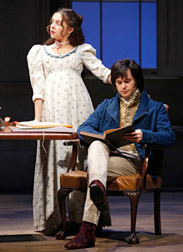|
Lucy KomisarStoppard's "Arcadia" is an engrossing, provocative intellectual argument couched in a mystery
It is 1809 at Sidley Park, an estate in Derbyshire,
England. Thomasina Coverly (Bel Powley), the precocious 13-year-old
daughter of minor aristocrats, is being tutored by the sensitive,
charming Septimus Hodge (an appealing Tom Riley). She is developing
a complicated mathematical theory that even she doesn’t
understand.
Some 180 years later, at the same estate,
the main room with high windows, French doors, and a skylight
is still dominated by a wooden trestle table upon which sits
a turtle. Now it is the setting for a scholarly conflict between
writer Hannah Jarvis (Lia Williams) and poet and critic Bernard
Nightingale (Billy Crudup), who are looking for documents that
could tell what happened at the earlier time. Hannah is writing
about landscape and literature and the decline from thinking
to feeling. She doesn't like sentimentality. Williams is cool,
cynical and strong as the modern woman.
But we are confronted with another puzzle
relating to goings-on nearly two centuries earlier. Bernard
has found a book in the library of Lord Byron that connects
him to Sidley Park. It seems that Byron and Septimus were school
boys together at Trinity. Bernard says he has discovered why
Byron left the country. His clues are letters found in Byron's
book relating to a literary review attacking Chater. He asserts
that Byron visited the estate and later killed Chater in a duel.
Crudup is very good as the obnoxious academic critic, who is
hyper, loud, pushy and, like Chater, pretentious, only smarter.
Director David Leveaux shifts repeatedly and
easily between centuries and characters, with costume changes
a sharp reminder that we have gone to another era. So it's rather
startling and provocative when characters and scenes suddenly
mix!
| lobby | search
| home | cue-to-cue |
discounts | welcome | film
| dance | reviews
| |
||||||||





